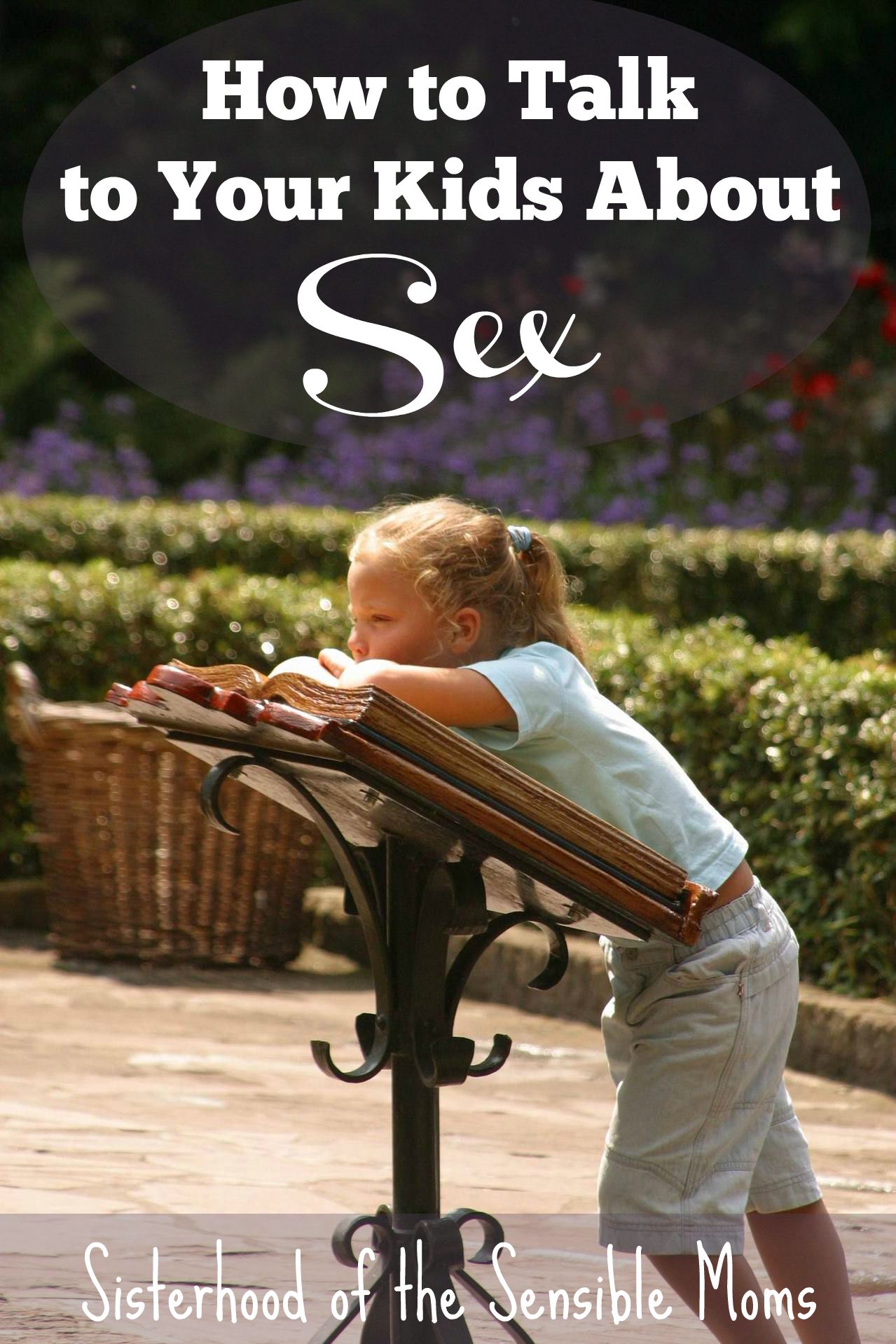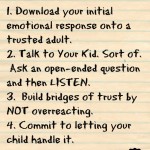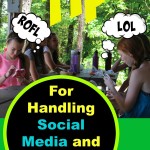If you have kids, after worrying about what to feed them, where to educate them, and when it’s the right time to sell them to the circus, you’re probably also wondering when it’s time for THE TALK.

We have a few caveats and some great tools to help ease you into this big moment which is really not so very big, we promise. We’ve not only been through it ourselves multiple times, but we have the power of professionals to help guide you in the right direction. With Erin’s education degree and Ellen’s medical degree, we might have a resource or two up our sleeves.
1) It’s not THE TALK.
I know we just said it was THE TALK, but that’s because we knew what you were thinking. The truth is that sex (and honestly the drug and alcohol and peer pressure talks too) aren’t one offs. They are part of an on-going discussion you are going to have with your kids about the science of how a body changes, the emotional and social changes they will face during puberty, sexuality itself, and, if you are religious, how sex aligns with their faith life. It’s not one talk but a lifetime of conversations.
2) Talk early.
Talk early and often. If you want some concrete examples of how we really do this in real time with real kids, check out these five things we actually talk about with our kids. The bottom line is that we never start the talk with “hey, kids, let’s talk about sex now.” If a conversation provides a natural segue to an important topic, seize the opportunity.
3) Give them bite-sized nuggets.
Once you start talking, keep it simple, short, and, if you can muster it, sweet. While we encourage taking advantage of conversation openers, we do not recommend information dumps. Did you see all the talking points you have to get through when you are talking about sex? Keeping things short will not only make your talks more palatable for both of you, but it will give you both time to digest what was said.
4) Drop the euphemisms.
What you say is not nearly as important as how you say it. Be honest, approachable, and open. If you are not feeling comfortable, then fake it until you make it, because this is a hugely important point when discussing sex with kids. Notice how we didn’t pepper the title of this post with talk of birds and bees? You want your kids to learn early and often that you will give them the straight-up, honest story. You want them to see you as the ultimate purveyor of truth long before those hormones kick in and try to tell them otherwise.
5) Follow their lead.
Answer the question they are asking. A simple query about periods doesn’t mean you have to cover sex from A to Z. (Remember, bite-sized nuggets.) That’s a rookie mistake that Erin might have made, but now you don’t have to, the wisdom of a shared experience, friends. You will get to sex eventually, but you should start wherever they are.
6) Respect their privacy.
It’s awfully tempting to tell Grandma or your friends about what you are going through as a mom. Standing on the brink of puberty IS a big change for all of you, but this is their story and it’s time to start acting like a vault. Your son’s morning erections are not fodder for book club discussion. The good news is that if you’re a really good vault, you’ll get the important “secrets” later on.
7) Educate yourself.
There are such great resources for parenting through the teen and tween years. We have a really helpful booklist and podcast that will let you not just survive but thrive during these years. These books are chock full of great information about the growth of the teen mind, the emotional life of adolescents, and really good tips for how to parent them through the tough stuff during these years. They will be great additions to your bedside table for the coming years. How do we know? They are the ones sitting on ours.
8) When in doubt, start with a book.
Still flummoxed about how to get this party rolling? We have some ideas. In particular, pull out a book and pull it out early.
The Harris and Emberley series are the stand-by books we recommend to everyone. Ellen researched the heck out of what to give to her own girls and this was the series she settled on. Erin was quick to adopt them as her go-to, also. Appropriate for as young as pre-school, there are different ways to use them to get the conversation ball rolling.
1. Read each chapter together and discuss at the end.
2. Have them read it on their own and come to you with questions.
3. Have talks and THEN give them the book.
4. Just give them the books to read and let it go. (You’ll be able to tell they’ve been read.)
Erin, with her five kids, can attest that each child has a different comfort level and relationship with these resources and it’s very important to take their lead. Just remember, bite-sized nuggets! For the love of puberty, don’t plop all the books on their laps at one time.

This is the first book in the series and you can start using it as early as preschool. Great artwork accompanies good scientific information about bodies, keeping healthy, and age-appropriate sexual information. Good up through early elementary school.
It’s So Ama
This one picks up where the first left off but keeps the same comic-style artwork and entertaining text. This one kind of carries through until middle school.

For years, this has been the educator’s go-to guide for teaching sex to tweens and teens for a reason: it’s a great read for kids and adults alike. It’s been updated with great information about keeping safe on the internet and new chapters on gender identity. The newest edition reflects the world our kids our living in and allows for meaningful conversation on all aspects of sexuality.
9) Exhale.
You can do this. We believe in you and we’ve got your back in addition to a whole lot of great resources for you to use if you need them. Forget those silly birds and bees, and get talking about sex with your kids today! You’ll be happy you did.
-Ellen and Erin
You can follow us on Google+, Twitter, Facebook, Instagram, and Pinterest.
Check out our books, “I Just Want to Be Alone” and “You Have Lipstick on Your Teeth.”
















We were just talking with friends about this last night! She was scooping us on how much books helped her–I want to win this. Thanks for always giving so much needed help with this parenting gig, ladies!
Meredith recently posted..Our Love Affair with the Butt-Kicking Black Widow
BTW – Cider Mill Press asked us to remove our review and giveaway of their books from this post. We have created a new post for the giveaway and your entries are still recorded and valid.
We got our boys a simple book, similar to the series you list here, when they started being interested in the differences between boys and girls. I think it’s called, “What’s the Big Secret?” When I was pregnant with our fourth boy a few years ago, the older ones wanted to know how the baby got in there, so we pulled out the book again to explain the basic science of it. Oldest did ask later how the sperm got in there and then made an EW! face when I explained. He was 8 or so at the time. He’s 10 now and we’re coming up on a more in-depth talk sometime in the next year, I think.
We’ll have to check out that series!
BTW – Cider Mill Press asked us to remove our review and giveaway of their books from this post. We have created a new post for the giveaway and your entries are still recorded and valid. Ellen